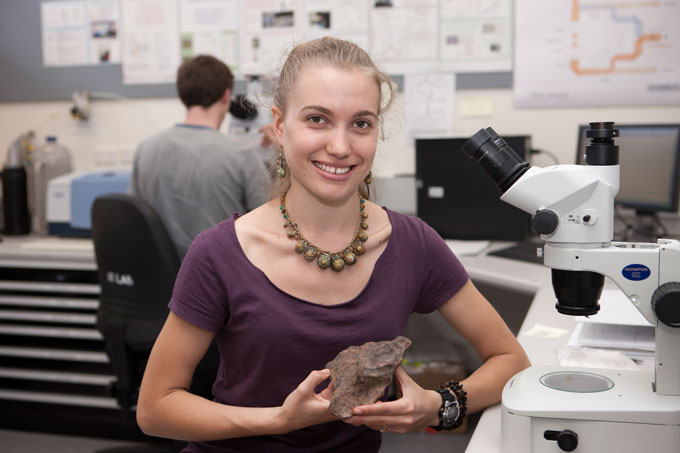Earth Sciences student Rachel Kirby wins Janet Elspeth Crawford Prize
For ANU PhD student, Rachel Kirby, completing her Honours thesis brought about some unexpected surprises. Rachel was the recipient of 4 awards, three of these from ANU.
“For my thesis I was looking at a type of meteorite which is very unusual, very rare and from this thesis I was presented with 4 awards. Three of these awards actually happened without me even knowing about it,” Rachel said.
Rachel was awarded the Janet Elspeth Crawford Prize which is given to the top female student graduating from science in Honours at ANU. Unlike most years where the award has historically gone to a Physics or Mathematics student Rachel says it was her passion for her studies that helped her gain the marks and eventually the prize in the area of Earth Sciences.
It was Rachel’s passion and hard work that guaranteed her a nomination by the Dean of Science and the Heads of Schools. “Study what you’re passionate about because you will only succeed in something if you’re interested in it as this helps you work hard,” she said.
Rachel’s thesis also helped her win the University Medal which is awarded to undergraduate candidates who obtain first class honours supported by a distinguished academic career and the John Conrad Jaegar Scholarship for PhD Research in Earth Sciences. Again Rachel had no idea she had been considered for these awards. “There are actually quite a lot of opportunities for scholarships when you start your degree. I wasn’t aware of them when I began but it’s been a wonderful surprise to receive so many.”
Rachel is starting her PhD this year and hopes to put her award prize money towards her studies however she believes the value of these awards is more than financial.
“The awards demonstrate both my academic merit and the regard that others hold in me. And personally it feels great to be recognised for all the hard work I put in to my undergraduate degree,” she said.

